Government reinstates health insurance to private sector
The government has reversed an abrupt policy change implemented without notice on Saturday night to exclude private healthcare providers from the state’s free health insurance scheme.

08 May 2017, 09:00
The government has reversed an abrupt policy change implemented without notice on Saturday night to exclude private healthcare providers from the state’s free health insurance scheme.
The government-owned Aasandha health insurance company had informed private hospitals and clinics of the decision in a late night circular while results from Saturday’s local council elections were being announced.
Agreements made with private healthcare providers were also dissolved after the National Social Protection Agency’s board instructed the Aasandha company to implement the policy change.
But in a statement on Monday, the president’s office insisted that it did not advise or instruct NPSA to restrict the insurance scheme to public hospitals.
Become a member
Get full access to our archive and personalise your experience.
Already a member?
Discussion
No comments yet. Be the first to share your thoughts!
No comments yet. Be the first to join the conversation!
Join the Conversation
Sign in to share your thoughts under an alias and take part in the discussion. Independent journalism thrives on open, respectful debate — your voice matters.




